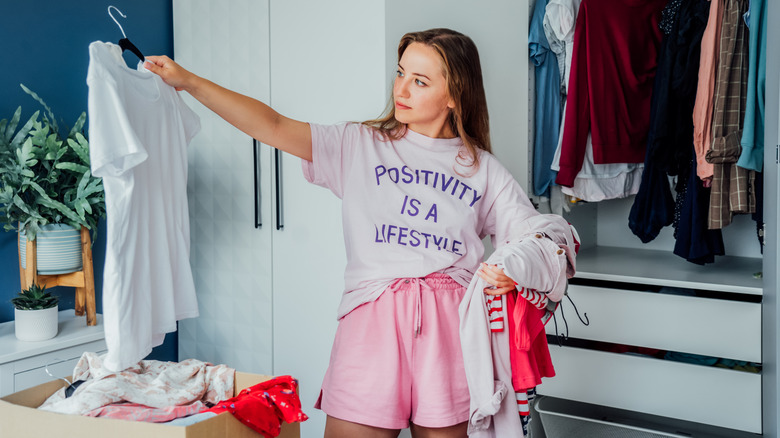Cobwebbing: The Refreshing Dating Trend, Explained
When it comes to dating trends, there's no end in sight. Just when we think we've fully grasped the latest concept, another one arises that has us banging our heads against the wall. But as we've also learned, not all dating trends are bad and need to be understood to actively avoid them. Some, like canon-bailing, actually play in our favor. So before you start thinking ill of cobwebbing — its name is a bit deceiving, after all — hold up because this is a trend you want in on.
"Cobwebbing is an active and intentional process of clearing out residual emotional and physical baggage of past relationships," Jessica Hunt, LCSW exclusively tells Women. "It's a conscious effort to eliminate anything that keeps you tethered to an ex." As Hunt explains, this can be finally unfollowing them on social media, deleting their contact information, or ditching anything at all that reminds you of them. "The goal of cobwebbing is to move on with a clean slate to make room for something new."
Although cobwebbing may seem like a scary step for some people, more than anything it's an act of healing and self-care. You're putting yourself first and realizing, as Alice Walker said, "the only way forward is with a broken heart." To help you understand why it's time to start cobwebbing and the benefits that come with it, Women spoke exclusively to licensed sexologist Jessica Hunt, LCSW, and relationship therapist Sofie Roos of Passionerad, to help you master this dating trend.
Why cobwebbing is beneficial
While there's certainly nothing wrong with holding on to some of the past, the fact remains that sometimes you need to shed at least the bulk of that past — especially if it's holding negative or toxic energy — if you want to move on healthily. "Lingering feelings and reminders can make you feel like you're in relationship limbo and cobwebbing helps regain a sense of control," says Jessica Hunt, adding that when you feel in control again, your confidence gets a boost that propels you into happier territories with healthier people.
As Sofie Roos explains, cobwebbing is beneficial because you're decreasing the amount of time and energy you waste on an ex. "Every time you see something that reminds you of them, you will stop and lose focus, energy, or just get sad," says Roos. Even the smallest items, like a trinket or receipt from a special occasion can have this effect and it does slow down the moving-on process. But when you use cobwebbing to remove the emotional and physical reminders, it makes space — space you may not have known you needed. "There's more room for you to make yourself bloom and shine, which can make you re-find yourself," says Roos. "For example, if your ex was the one doing all the decor at your place, you now have the opportunity to find a way to truly express yourself as well as move on easier."
What are some actionable ways to cobweb?
While out of sight out of mind works, not everyone can rid their lives of everything all at once. Because of this, Sofie Roos suggests cobwebbing in stages. "You might want to start giving clothes back and get rid of personal gifts, but wait longer with deleting photos," says Roos. You also don't need to throw things out; boxing them up and getting them out of sight is what matters. But still, don't rush it. "There's an idea behind taking things slowly, because then you can keep symbolically cobwebbeing during your grief," says Roos. "If you still have things to get rid of along the road of forgetting and getting over your ex, you can still symbolically put them in a box and throw it away."
Another actionable step is putting words to paper. We know that journaling is great for mental health, so consider writing your goodbye down in the form of a letter. According to Jessica Hunt, this is a tactic she's used with clients. "You don't actually send the letter or have this closure conversation with them, but it's a way to get out all the things you wish you could say to them, so they're not just swimming around in your head. The release is very cathartic," says Hunt, who reiterates the importance of journaling while cobwebbing. "[Journaling] can help you process any unresolved feelings or explore why you're having a hard time moving on," explains Hunt.
Is it ever okay to hold on to pieces of the past?
If you're wondering if it's okay to keep part of the past, the answer is yes. As Oscar Wilde put it, "To deny one's own experiences is to put a lie into the lips of one's own life. It is no less than a denial of the soul." You're not denying what once was, you're simply making space in a healthy way that allows you to grow and evolve. But be reasonable about what you keep in plain view.
"The main thing to ask yourself is if it's healthy for you to hold on to it," says Jessica Hunt. "Cobwebbing is for when the remnants of the relationship are holding you back. If those items or memories aren't and, with time, just feel neutral or positive, then keeping them around is great." Sofie Roos goes so far as to recommend that you hang on to some things. "When you have moved on, you often look back and regret you didn't keep anything from that relationship that could have served as a symbol for how you felt back then, and that can remind you of how much you've grown since," says Roos.
There's no easy way to get over a relationship, whether it's romantic or platonic. But if you're noticing that there are specific items that are still hanging around and those items aren't releasing you from the past, then it's up to you to do the releasing.



